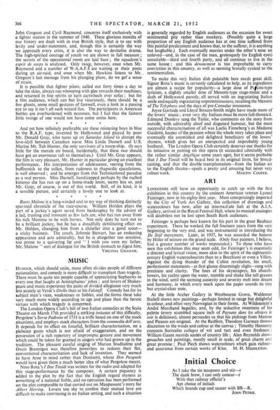MUSIC
HUMOUR, which should unite, more often divides people of different nationalities, and comedy is more difficult to transplant than tragedy. There must be quite ten people capable ..of appreciating Sophocles to every one that laughs at Aristophanes' jokes ; and lovers of Shakes- peare and music experience the pains of divided allegiance very much less acutely at Verdi's Otello than at his Falstaff Comedy has for its subject man's vices, weaknesses or foibles, and the forms these take vary much more widely according to age and place than the heroic virtues with which tragedy is concerned.
The London Opera Club's bill of two Italian comedies at the Scala Theatre on March 17th provided a striking instance of this difficulty. Pergolese's Serva Padrona of 1733 is a trifle based on one of the stock situations, and employs stock characters from the commedia dell'arte. It depends for its effect on forceful, brilliant characterisation, on a plebeian gusto which is not afraid of exaggeration, and on the possession of a rich repertory of impromptu gesture and movement which could be taken for granted in singers who had grown up in the tradition. The pleasant careful singing of Marion Studholme and Owen Brannigan was therefore powerless to redeem' their flat, conventional characterisation and lack of invention. They seemed to have Arne in mind rather than Donizetti, whose Don Pasquale would have given them a much better idea of what Pergolese meant. Nino Rota's I Due Timidi was written for the radio and adapted for this stage-performance by the composer. A certain piquancy is added to the plot by the fact that the English regard shyness as something of a national foible, and no operation has been performed on the plot comparable to that carried out on Maupassant's story for Albert Herring. Lovers too shy to confess their mutual love are difficult to make convincing in an Italian setting, and such a situation is generally regarded by English audiences as the occasion for sweet sentimental pity rather than mockery. (Possibly quite a large proportion of any English audience has at one time suffered from this painful predicament and knows that, to the sufferer, it is anything but laughable.) Each eventually marries under the other's nose an unloved—and, in the case of the man, grotesquely (to English eyes) unsuitable—third and fourth party, and all continue to live in the same house ; and this denouement is too improbable to carry conviction in this country, as well as seeming brutally cynical to the sentimentalists.
To make this very- Italian dish palatable here needs great skill. Signor Rota's music is certainly calculated to help, as its ingredients are almost a recipe for popularity—a large dose of Pticini-type lyricism, a slightly smaller dose of Menotti-type stage-mtisic and a dash of Hollywood parody, all . served with an ingratiating Italian smile and equally ingratiating unpretentiousness, recalling the Menotti of The Telephone and the days of pre-Consular innocence.
Joyce Gartside and Lloyd Strauss-Smith might have made more of the lovers' music ; even very shy Italians must bemore full-throated. Edmund Donlevy sang the Tailor, who comments on the story from outside, with admirably aloof and disguised humour, but the most successful characterisation of all was Laelia Finneberg's as Madame Guidotti, keeper of the pension where the whole story takes place and eventually the astonished and delighted beneficiary of the lovers' shyness, which gives her an unexpected and improbably young husband. The London Opera Club certainly deserves our thanks for its initiative in putting on this opera (it succeeded admirably with the rather similar Angelique some years ago), but it seems probable that I Due Timidi will be heard best in its original form, for broad- casting, and that the double transplantation—from the Italian air to the English theatre—spoils a pretty and amusing but never very


































 Previous page
Previous page